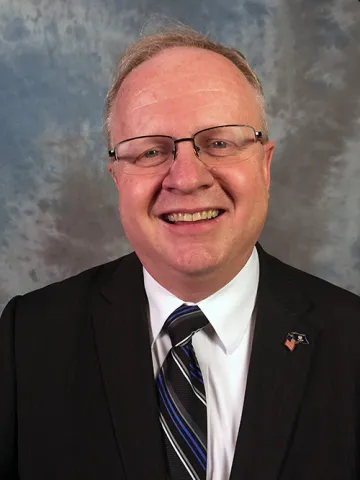When a defendant is convicted of a crime in federal court, he or she owes many debts to society. In addition to likely prison time, offenders may be required to pay thousands of dollars in restitution, fines, and special assessments after sentencing.
Actually collecting that money can be a massive challenge. However, under a year-old partnership, the Financial Litigation Unit (FLU) of the Department of Justice has received access to OPERA (Offender Payment Enhanced Report Access), a Judiciary application that tracks offenders’ payments, making it easier to monitor the collection of unpaid criminal debts.

Donald Martenz, left, and William "PJ" Isbell, right.
“We’re seeing greater efficiency in collecting payments for the government and victims,” said William “PJ” Isbell, Programmer Analyst for the U.S. District Court for the Southern District of Alabama, who helped create OPERA in 2009. “A lot of these debts may never be fully paid, but to get as far as we can with it is very exciting.”
Criminal offenders currently under the supervision of federal probation officers owe more than $17 billion in criminal monetary penalties. That number balloons to nearly $120 billion when debts from those who have completed supervision are factored in.
Collecting debts from offenders is inherently difficult, given that most have little money, and limited employment opportunities. But OPERA addresses one longstanding institutional barrier: the government’s fragmented debt collection process.
Probation officers where offenders live monitor whether debts are being paid, and notify the court of noncompliance. The clerk’s office where a conviction occurred, sometimes in a different district, receives and records the actual payments. The DOJ’s Financial Litigation Unit, which initiates any needed legal enforcement actions, such as wage garnishments and asset levies, has statutory authority to collect criminal monetary penalties from offenders. DOJ and the Courts also must reconcile their separately maintained payment records with each other on a periodic basis.
In 2009, the Judiciary launched OPERA so that probation officers could quickly monitor payment histories in a secure, web-based application, without having to contact the finance department of the court clerk’s office. OPERA immediately simplified the process both for clerk’s office and probation staff.
“Someone we’re supervising might tell us he just made a payment,” said Donald Martenz, Supervising Probation Officer for the District of New Jersey. “With OPERA, we can bring up an offender’s full payment history, right then and there, and confirm the payment was made, or address any noncompliance issues.”

Darrell R. Curtis
In late 2015, FLU was given access to OPERA, which provides payment and balance information in seconds. Previously, this required contacting individual clerk’s offices, case by case.
“This always was a time-consuming process. It could take hours, it could take days,” said Darrell Curtis, Management Analyst for the Executive Office for United States Attorneys (EOUSA). “It’s been a great asset. It’s really enhanced our ability to enforce debts.”
In the first year of the partnership, FLU personnel used OPERA more than 130,000 times, averaging about 500 daily inquiries. In turn, Judiciary data indicates that courts saved about $513,000 in staff time that was no longer dedicated to providing financial information from offenders’ account records.
“It can be a big pile of paperwork,” said Isbell, who works for the clerk of court in Mobile, Alabama. “Our finance department was constantly getting emails. Having to generate reports for DOJ was taking up significant staff time.”
Martenz indicated that easily accessible data helps probation officers spend more time on supervising offenders, and less time on chasing paper work.
Even with the most aggressive supervision system, most debts are not collectible. Often people under supervision no longer have access to whatever money they may have gained from their offenses, and sometimes the funds are lost to addiction and other problems. It is not unusual for illegal funds to have been spent on living and other expenses, making them unrecoverable. Also, an offender's financial condition usually deteriorates while in prison, with interest accumulating on personal debts, child support, back taxes and other obligations. Compounding all this, many offenders struggle to find employment once they return to the community, due to their criminal history. Consequently, offenders' net worth and income tend to be limited.
In some instances, defendants also caused more harm, and are subject to more restitution, than they can ever hope to repay. For example, a group of young, relatively destitute offenders started a forest fire in California that resulted in millions of dollars in damage. The victims, and the court, wanted them to be held as accountable as possible, even if it meant they could only make small payments proportional to their income and net worth.
Despite such challenges, Martenz said collection rates have improved from less than 5 to more than 15 percent since OPERA became a national tracking system, resulting in the collection of more than $1 billion in additional funds.
“We have collected more money, and we have fewer defendants in delinquent status,” Martenz said. “Most of this money goes back to victims, so even if we’re only taking an additional one percent, when you’re talking about $120 billion, it makes a real difference.”
Curtis said the partnership is a positive example of how different branches of government can work together to achieve a shared goal.
“We’re all trying to make victims whole,” Curtis said. “Debts are more collectible if you go after individuals from the start. We want to improve collections any way we can.”
This article was updated on March 31, 2017.
Subscribe to News Updates
Subscribe to be notified when the news section is updated.
